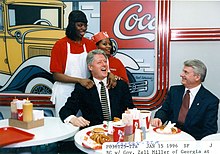Zell Miller
In 2004, he backed Republican president George W. Bush over Democratic nominee John Kerry in the presidential election.
Miller received an associate degree from Young Harris College in his home town[8] and later attended Emory University.
[1] Less than a month after the Korean War armistice, Miller wound up in a drunk tank in the mountains of North Georgia.
[9]After serving in the Marines, Miller enrolled in 1956[1] and earned bachelor's and master's degrees in history from the University of Georgia.
In these congressional races, Miller denounced Lyndon Johnson as ""a Southerner who has sold his birthright for a mess of dark porridge.".
[13] Miller's first experience in the executive branch of government was as Chief of Staff for Georgia governor Lester Maddox.
In 1980, Miller unsuccessfully challenged Herman Talmadge in the Democratic primary for his seat in the United States Senate.
Senator) after defeating former Atlanta Mayor Andrew Young and future Governor Roy Barnes in the primary.
[20] Miller gave the keynote speech at the 1992 Democratic National Convention at Madison Square Garden in New York City.
[21]Twelve years later, Miller would give the keynote address at the opposing party's convention, also held at New York's Madison Square Garden, in 2004.
As governor, Miller was perhaps best known for his advocacy of a law passed in Georgia known as "two strikes and you're out", as any person convicted for the second time of any included offense would automatically be sentenced to life imprisonment without the possibility of parole.
It was approved by voters on November 8, 1994, and was signed into law by then Governor Zell Miller on December 15, 1994, and went into effect on January 1, 1995.
Although the Democratic Party's historic control of Georgia politics had been waning for years, Miller remained popular.
He supported much of George W. Bush's agenda, including tax cuts (which Miller co-sponsored[24]) and oil drilling in the Arctic National Wildlife Refuge.
The book spent nine weeks in the New York Times Best Seller list for hardcover non-fiction, peaking at number four.
[28] He also announced that he would support President George W. Bush in the 2004 presidential election rather than any of the nine candidates then competing for his own party's nomination.
[29] Shortly after announcing his retirement, Miller began to call for the repeal of the Seventeenth Amendment to the United States Constitution, which allowed for the direct election of U.S.
[31] Democratic Congresswoman Denise Majette sought to fill Miller's Senate seat, but lost the 2004 election to Republican Johnny Isakson.
[32] In his keynote speech at the 2004 Republican National Convention, delivered on September 1, 2004, Miller criticized the state of the Democratic Party.
The B-2 bomber, that Senator Kerry opposed, delivered air strikes against the Taliban in Afghanistan and Hussein's command post in Iraq.
The F-14A Tomcats, that Senator Kerry opposed, shot down Khadafi's (sic) Libyan MiGs over the Gulf of Sidra.
The Apache helicopter, that Senator Kerry opposed, took out those Republican Guard tanks in Kuwait in the Gulf War.
First, in an interview with CNN, Miller had a dispute with Judy Woodruff, Wolf Blitzer, and Jeff Greenfield when they questioned him on his speech, particularly on whether he had misinterpreted the context and full content of Kerry's votes, and the fact that Dick Cheney, as Defense Secretary, had opposed some of the same programs he attacked Kerry for voting against.
Calling for Democrats to change their message, he authored a column, which appeared in The Washington Times on November 4, 2004, in which he wrote: Fiscal responsibility is unbelievable in the face of massive new spending promises.
[40] The same year, Miller endorsed Doug Collins, the Republican candidate in the 9th District of Georgia congressional race.
[44] Miller was a speaker at "Justice Sunday II," an event organized by conservative Christian evangelicals to combat alleged liberal bias in the federal judiciary of the United States.
Miller criticized the United States Supreme Court, saying that it had "removed prayer from our public schools ... legalized the barbaric killing of unborn babies and it is ready to discard like an outdated hula hoop the universal institution of marriage between a man and a woman.
[1][5][49] His state funeral was held in Atlanta on March 28 with incumbent governor Nathan Deal, U.S. secretary of agriculture Sonny Perdue, U.S. senator Johnny Isakson, former senator Max Cleland, former lieutenant governor Pierre Howard and three former U.S. presidents—Jimmy Carter, Bill Clinton and George W. Bush—in attendance.


